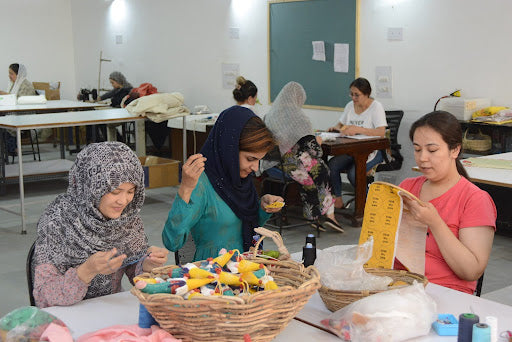Article: Silaiwali: A Sustainable Journey of Handmade Craft, Empowering Refugee Women Artisans

Silaiwali: A Sustainable Journey of Handmade Craft, Empowering Refugee Women Artisans
A quiet revolution is brewing in the heart of South Delhi’s vibrant Khirki Extension amidst a mosaic of historical ruins and street art. This culturally rich neighbourhood, home to many marginalised communities, including Afghan refugees, is also the birthplace of Silaiwali, a unique social enterprise blending creativity, sustainability, and empowerment.
Founded in 2019 by Iris Strill and Bishwadeep Moitra, Silaiwali is more than just a craft studio—it's a beacon of hope for refugee women artisans, many of whom are from the Hazara tribe, a persecuted minority in Afghanistan. Silaiwali employs these women to handcraft eco-friendly rag dolls, bag charms, animal dolls, festival ornaments, wall art, planet friendly hangings and little dollies using upcycled fabric sourced from fashion manufacturers. This venture not only provides a livelihood but also preserves traditional craft skills in a way that is globally loved by customers and truly sustainable.

Embroidery and crochet work are part of the cultural heritage of Hazara women. At Silaiwali, they have put their natural talent to good use during this time of displacement and loss.
Handmade with Love: Empowering Refugee Artisans
Silaiwali’s mission is deeply rooted in supporting marginalised Afghan women artisans through sustainable production practices. What began with just ten women artisans has now grown to over 40, all playing a vital role in running the studio. The artisans create beautiful rag dolls from fabric scraps—leftover cuttings from India’s fast fashion industry. This approach is part of the brand’s zero-waste philosophy, transforming discarded materials into globally cherished products.
Each doll tells a unique story. Dressed in hand-stitched, traditional outfits, these dolls are more than toys—they are symbols of cultural heritage and craftsmanship. Creating each piece is entirely circular, with upcycled materials being the foundation of every product. This zero-waste ethos extends beyond just doll-making, as Silaiwali has expanded into fashion accessories and home decor, all crafted from reclaimed fabrics.

A swanky concept store in Basel, Switzerland, showcases Silaiwali dolls in its classy window!
Eco-Friendly Craft with a Global Reach
Silaiwali’s rag dolls have captured the attention of global markets. Today, these eco-friendly products are sold in over 135 cities worldwide, from high-street stores like Merci in France to boutiques in the U.S., such as New York’s Banjanan. Participation in prestigious international trade fairs like Maison&Objet has further cemented the brand’s reputation, making it a globally recognised name in sustainable fashion and home decor.
Despite its international success, Silaiwali remains self-funded, relying on its artisans' hard work and creativity rather than heavy advertising. While sales in India account for only about 5% of their revenue, the brand resonates with a global audience that values sustainable, handmade products. Silaiwali has also become part of the UNHCR’s MADE51 program, which connects refugee-made products with the global market, ensuring that these artisans’ work finds a home internationally.

Silaiwali is certified as “Upcycled Textile Manufacturer” by the Ministry of Textiles, Government of India.
Circular Production: A Model for Zero-Waste Fashion
Silaiwali’s commitment to sustainability doesn’t stop at recycling fabric scraps. The entire production process is based on a circular economy model. From sourcing upcycled materials to creating durable and long-lasting products, the brand avoids contributing to the wasteful practices of the fast fashion industry. The dolls and decor items produced here are sustainable and cherished as timeless pieces.
Silaiwali stands out as a pioneer of zero-waste production in a world increasingly conscious of environmental impacts. Breathing new life into discarded fabrics, they are helping shift consumer habits towards more eco-friendly, circular options.

Work & play: Silaiwali artisans share a light moment between intense periods immersed in making fine handicrafts.
A Space of Laughter, Creativity, and Hope
At the core of Silaiwali’s success is the community it has built. The studio in Khirki Extension is not just a place of work but a sanctuary where refugee women artisans can find support, joy, and purpose. Here, they decide their work schedules, divide tasks, and collaborate on design ideas. The studio is filled with laughter and music as they sew, chat, and create.
Silaiwali is more than just a sustainable business; it’s a testament to the power of social enterprise in transforming lives. Through their craft, these women are not only earning a livelihood but also gaining confidence and a sense of ownership over their work.

Hope for All: In these war-torn times, a refugee artisan at Silawali embroiders a message of love for the world.
The Future of Ethical Craftsmanship
In just five years, Silaiwali has grown from a small idea into a globally respected brand, loved by conscious consumers for its handmade, eco-friendly products. By empowering marginalised refugee women, upcycling fabric waste, and embracing a zero-waste approach, Silaiwali is setting an example for sustainable, ethical craftsmanship in the fashion and decor industry.
This Delhi-based social enterprise proves that with a commitment to sustainability and social good, beautiful things can be made—even from the scraps of fast fashion. As the brand grows, its mission remains the same: to create a better, more inclusive world, one handcrafted doll at a time.
